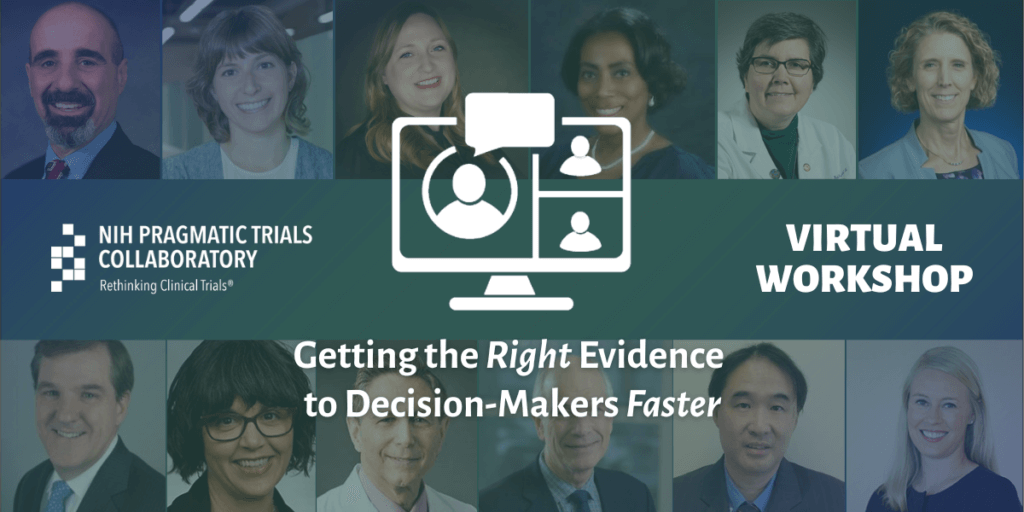 Materials and videocast recordings are now available from the NIH Pragmatic Trials Collaboratory’s recent workshop, “Getting the Right Evidence to Decision-Makers Faster.” The 2-day workshop explored the critical cycle of evidence generation by researchers to decision-making by healthcare system leaders to implement the findings of pragmatic clinical trials conducted within healthcare systems.
Materials and videocast recordings are now available from the NIH Pragmatic Trials Collaboratory’s recent workshop, “Getting the Right Evidence to Decision-Makers Faster.” The 2-day workshop explored the critical cycle of evidence generation by researchers to decision-making by healthcare system leaders to implement the findings of pragmatic clinical trials conducted within healthcare systems.
Access the complete workshop materials, including slides and videocast recordings, as well as the keynote presentation by Andrew Bindman, executive vice president and chief medical officer for Kaiser Permanente.
Discussions from each workshop session are summarized below.
Panel 1: How Have Health Systems Made Decisions Based on Evidence Collected in PCTs?
In pragmatic clinical trials, the study interventions are designed to align with healthcare system priorities, infrastructure, and operations, with the goal of easing implementation during the trial and increasing the likelihood that effective interventions will be translated into practice. Yet, in the NIH Collaboratory’s experience, effective interventions are not always adopted into routine practice, and interventions that did not achieve their intended effects sometimes are. Using examples from NIH Collaboratory Trials, panelists discussed reasons why healthcare system leaders might decide to adopt ineffective interventions, such as benefits for subgroups, improvements in secondary trial outcomes, and benefits for staff. Panelists also discussed reasons why healthcare system leaders might not elect to adopt or sustain interventions that were effective, including cost, feasibility, and alignment with policy incentives and other requirements or priorities. Access the complete workshop materials and videocast recordings.
Panelists: Devon Check, Vincent Mor, Lynn DeBar, Kathryn Glassberg, Douglas Zatzick, Eileen Bulger, Susan Huang, Kenneth Sands, Edward Septimus; Moderator: Gregory Simon
Panel 2: How Do We Generate the Right Evidence to Support Decision-Makers?
Researchers and healthcare system leaders who have worked on NIH Collaboratory pragmatic trials emphasized the importance of researchers being well connected to their healthcare delivery systems. Another major theme was the need to communicate usable results to healthcare system leaders, which may not always be reflected in the primary outcomes of traditional clinical trials. Panelists discussed considering composite and secondary outcomes as options during study design while still maintaining scientific rigor. Access the complete workshop materials and videocast recordings.
Panelists: Kenneth Sands, Eileen Bulger, Edward Septimus, Amy Kilbourne, Rosa Gonzalez-Guarda, Patrick Heagerty; Moderator: Hayden Bosworth
Panel 3: Learning Faster
A pragmatic clinical trial can provide generalizable effectiveness data about an intervention that is tested in the real-world settings where patients receive usual clinical care. These trials are at higher risk for failure when the goals of the research and healthcare system operations are not aligned. Panelists discussed implications for data monitoring and the different expectations for fidelity and adherence that may require careful consideration of the rules for modifying or stopping the trial. Careful attention to ethical and regulatory considerations is also important, especially given the dynamic and real-world contexts of pragmatic trials. Access the complete workshop materials and videocast recordings.
Panelists: Gloria Coronado, Natalia Morone, Corita Grudzen, Kevin Chan, Pearl O’Rourke, Cheryl Boyce, Andrea Cook; Moderator: Kevin Weinfurt
Panel 4: Potential Structures and Incentives for Faster Learning
The NIH Collaboratory has facilitated better, faster learning by helping individual pragmatic trials be successful. The Coordinating Center infrastructure helps build relationships and bring peers together to reflect on challenges. It is these types of partnerships that are a critical element of being able to problem solve in a pragmatic trial. Researchers shared that while principal investigators may be hesitant to speak with their trial’s NIH project officer, these conversations can be very productive in finding a way forward when roadblocks occur. Despite incredible efforts by investigators, studies often do not go according to plan. Rather than embracing failing faster, panelists advocated for a philosophy of learning sooner. In some cases, this may mean examining whether continuing a trial represents a good use of funding. Access the complete workshop materials and videocast recordings.
Panelists: George Sopko, David Chambers, Wynne Norton, Tisha Wiley, Kenneth Sands, Edward Septimus, Gloria Coronado, Natalia Morone, Corita Grudzen; Moderator: Richard Platt


